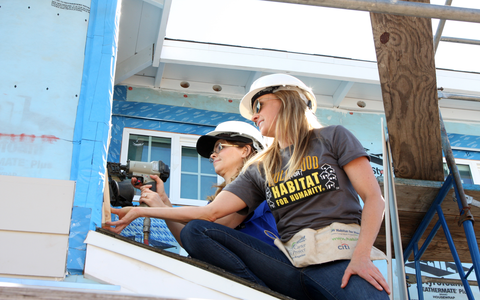 In previous posts, we’ve covered how much participating in medically-related activities—especially research, clinical experience, and shadowing—boost your medical school candidacy. But non-science-related extracurriculars are important, too! Med schools want to build a diverse class of interesting, multi-dimensional students with an array of interests. Your activities outside of medicine help demonstrate to admissions committees your values and your character, beyond your academic achievements and your motivation to become a doctor. In this post, we walk you through a few activity categories that can help round out your college experience and convey to med schools a full picture of who you are.
In previous posts, we’ve covered how much participating in medically-related activities—especially research, clinical experience, and shadowing—boost your medical school candidacy. But non-science-related extracurriculars are important, too! Med schools want to build a diverse class of interesting, multi-dimensional students with an array of interests. Your activities outside of medicine help demonstrate to admissions committees your values and your character, beyond your academic achievements and your motivation to become a doctor. In this post, we walk you through a few activity categories that can help round out your college experience and convey to med schools a full picture of who you are.
Non-Clinical Volunteer Work
In addition to participating in medically relevant clinical activities in which you have direct contact with patients, you may want to volunteer in other capacities. For example, you could tutor young students in lower-resourced schools, spend time with the elderly in nursing homes, or work in a local soup kitchen or food bank. Such activities would help you tap into – and further develop – your interpersonal and communication skills, as well as your commitment to helping others.
Boost your chances to get into your top choice medical school!
If you’re unsure where to begin, look to the existing clubs on your campus, which might facilitate volunteering in your school’s community, or to longstanding national organizations like Big Brothers Big Sisters. Another option is to help raise money for health-related associations, such as Doctors Without Borders or the Alzheimer’s Association. Beyond doing such service during the school year, consider taking an “alternative spring break,” during which you volunteer rather than take a vacation, either on your own or facilitated by an organization like Habitat for Humanity or United Way. Such activities will help you connect with and develop your empathic skills, meet like-minded people, and, as a bonus, demonstrate to medical schools your compassion and your commitment to a broader community.
Speaking a Second Language
It’s very likely that, in your career as a doctor, you will encounter patients who don’t speak English. Learning a second language, then—whether one commonly spoken across the United States, like Spanish, or a language commonly spoken in the community in which you hope to work—is bound to help you communicate with the patients you serve. If you weren’t blessed by being raised speaking multiple languages (or even if you were!), consider taking college coursework in another language, studying abroad, and/or doing a medical volunteer program in another country. Not to mention, learning a second language can prepare you for medical school itself in a surprising way. As Ali Lotfi, M.D. writes in U.S. News:
In some respects, medicine is like a foreign language with its own distinct terminology. A student learning French or Mandarin may spend hours learning new vocabulary and different verb tenses. Med students spend their first two years learning the names of diseases and medications, understanding pathophysiology and pharmacology. In both, only after repeated exposure to these concepts can they be put to use in practical settings.
Medical school admissions committees appreciate applicants’ ability and efforts to communicate with non-English-speaking patients. These efforts demonstrate applicants’ desire to broaden their cultural horizons beyond their own experiences. Speaking another language can also qualify you for clinical opportunities—like serving as an interpreter in a health care facility—that you wouldn’t be able to do otherwise.
Leadership and Team-Based Activities
Participating in activities that might seem, on the surface, totally unrelated to serving as a doctor—like club or intramural athletics, Greek life, or performing arts—can demonstrate to medical schools skills that will be vital in your role as a medical professional. Doctors need to be able to work well on a team, as well as to lead, think creatively, and maintain commitment and drive in the face of stress and setbacks. If you’ve been a loyal soccer player throughout your youth and college experience, it’s easy to imagine you as a committed medical student and future doctor, too. Often, participation in Greek life includes philanthropic activities, which shows a commitment to service. And many medical schools have their own music groups and theater performances as a creative outlet to balance the intensity of the academics and clinical work— and value having additional performing arts participants.
Participating in extracurricular organizations also shows that you are a multi-dimensional person and lead a balanced life. Not only will this make you a more interesting and engaging medical school classmate (and give your med school interviewers additional avenues along which to relate to you), it’s also vitally important to thriving in an intense, demanding career.
As you contemplate how to apportion your time and energy before college, go for depth over quantity. Earning the grades and MCAT scores required to apply to medical school and doing the recommended clinical work on top of that, is a time-consuming business. Beyond that, the goal is not to load your resume with as many activities as possible, but to invest in those that feel most fulfilling to you, and true to who you are. As you read through the above avenues, which option(s) called out to you most? Which feel like the most worthwhile, exciting, or rewarding activities to devote yourself to?
Applying to med school is a complex undertaking. If you would like guidance on any aspect of your pre-med preparation or med school application process, contact Collegiate Gateway. As always, we’re happy to help!
